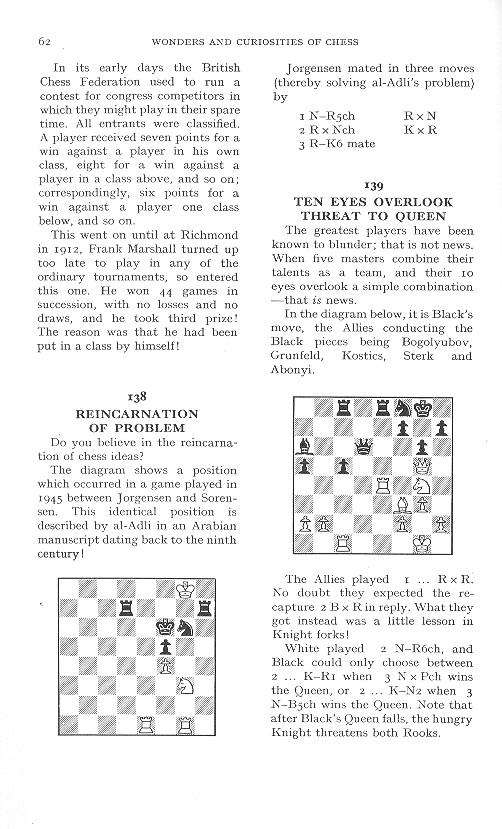
Edward Winter
Our Chess Awards article (C.N. 3157) discussed the shady ‘International Chess Writers Association’, whose Director, Mr Dimitrije Bjelica, has presented awards to an individual somehow picked by the ‘Association’ as the world’s best chess writer. For a lesson in excellence we therefore turn now to one of Mr Bjelica’s own books, Wonderful world of chess (published by ‘Chess press, Munchen’, undated).
It comprises 191 pages of positions and anecdotal snippets. A position on page 175 is referred to as ‘Grief-Browne, El Paso, 1973’. White was Grefe, but in Mr Bjelica’s hands even prominent masters’ names come to grief. Examples (and there are dozens of others) are Bleckburne, Bogolybov, Durq, Eliskazes, Kochnoi, Marozy, Opancensky, Relstab, Restalb, Schelchter, Schelther, Schlehter, Tarasch, Teylor, Yeats, Zukertot and Zuckertot.
When on page 189, the correct spelling Schlechter capriciously occurs, the opponent’s name goes wrong (‘Tiz’ instead of Tietz). It is but poetic justice that another wayward speller, Koltanowski, should have his name mangled by Mr Bjelica (i.e. ‘Kolatnovki’ on page 183).
Regarding the pawn ending discussed on page 42 of A Chess Omnibus, Fahrni-Alapin emerges as ‘Fharvit-Alpin’ on page 25. Some of the position headings seem almost to have been written in code. Page 43 has ‘Snosko Borovski-Preis Remsget, 1929’. Another English seaside resort that defeats Mr Bjelica comes on page 167, in a game which ‘Cole’ (he means Colle) won in Scarborough. He writes ‘Scerborou’, and it might just as easily have been Scooby-Doo.
When page 115 has a Harrwitz (‘Harwitz’) v Szen position from ‘London 1953’, that is a routine out-by-a-century typo, but what caused a game in Moscow between Torre and Dus-Chotimirsky (‘Dus Hotimovski’) on page 163 to be dated not 1925 but 1961? Or an 1860s game on page 37 between MacDonnell (‘Mack Donnell’) and Boden to be placed in 1830?
Page 71 says that Morphy lost only one blindfold game in his life, ‘in Birmingham in 1838’ (or ‘Brimingham’ on page 183). He was one year old at the time, and the mystery deepens when page 79 reports that he also lost a blindfold game in an ‘exibition’ in Paris. On page 51 Fischer is quoted regarding the best game ever played: ‘Mayby one of Adolf Andersson’s or Morpy’s.’ Page 171 cites Tal: ‘There are two kind of sacrifices – the corrects ones, and mine’s.’ On page 181 comes a famous remark attributed to Teichmann (‘Teichman’): ‘Chess is 99 of tactisc.’
Yet in the anecdotal snippets there are also passages of good English. Mr Bjelica being Mr Bjelica, the reason is not difficult to guess: the snippets have been snipped from other people’s books. The most blatant case of plagiarism concerns Wonders and Curiosities of Chess by Irving Chernev (Dover Publications, New York, 1974). Without any mention of Chernev or his book, many items have been crudely chopped up and reproduced in photographic form as Mr Bjelica’s own work. To illustrate the extent of the theft, here is page 62 of the Chernev book:

Enter Dimitrije Bjelica, armed with scissors, glue and photocopier, but no ethics. The result is the following, on pages 97 and 115 of his book:
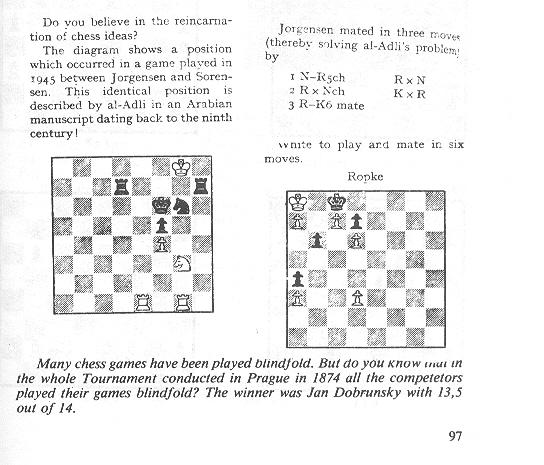
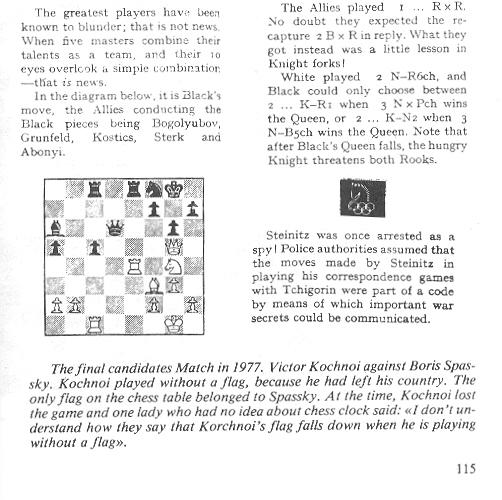
(3260 & 4108)
From Chess: the Need for Sources:
Page 171 of Dimitrije Bjelica’s Wonderful world of chess quotes Mikhail Tal:
‘There are two kind of sacrifices – the corrects ones, and mine’s.’
Before being tossed into the Bjelica mangling machine, the Tal quote was something like:
‘There are two kinds of sacrifices – sound ones, and mine.’
We write ‘something like’ because other wordings can be found, such as ‘two types of sacrifice’, but the above version is what Anthony Saidy gave on page 303 of the June 1973 Chess Life & Review. However, he merely reported there that Tal ‘once said’ it.
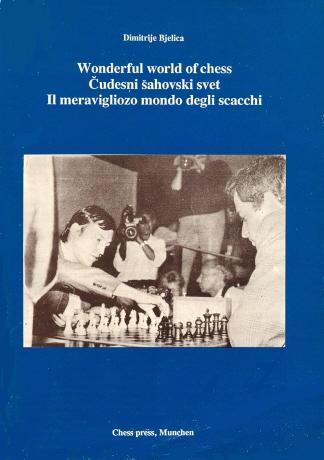
See also our feature article Copying.
A brief paragraph about linguistic skill on page 49 of Bjelica’s Wonderful world of chess compared ‘Ben Larsen’ to ‘Johanes Zukertot’ and concluded: ‘But Larse favourite player was not Zukertot but Nimzovic.’
(4747)
The magazine Gens una sumus, edited by Dimitrije Bjelica, first appeared after the 1986 Dubai Olympiad. Issue 2-3 is dated July 1987. The two issues contain a spectacular historical article by D.B. entitled ‘Kings of Chess’ in which the reader is introduced to such greats of the golden era as Blackbern, Dikon, Mongredijen, Grin, Anderson, Berd (Henri Eduard), Blackburn, Zuckertot, Vinaver, Mekenzy, Golmaj, Martines, Bahman, Janevski, Sesil de Vara, Andersen, Kolis, Levental, Harvik, Tarash, Pilsbery, Lloyd, Zueckertot, Charusek, Frenk Marshal, Byrne, Gunsburg, Mizes, Minoti, Li, Kiesericky, Cukertot, Mesona, Marocia, Marozi.
There is less fantasy with the modern masters, although the first issue does have an article by ‘Pol Banko, Granmster (USA)’.
(1695)

Tentative nomination for the chess book with the most misspellings of players’ names: Traité du jeu des échecs by Jean Taubenhaus (Paris, 1910). For example, pages 222-223 alone refer to de Rivičr, Andersen, Teichman, Maison, Tarrasche, Mises, Zuckertort, Levis, Marocy, Veiss, Jaowski, Vinaver, Lepchitz, Soldatenkor, Benstock, Forgace, Snosko-Borouski, Holperin, Salve, Zukerlort, Blackburn, Marschal, Nuzio, Cochran, Kieseritzki and Chotard.
The proofreader is apparently still alive and working on books by Dimitrije Bjelica.
(2212)
The Times of 22 April 1995 (page 20) reported in all seriousness that Mr Raymond Keene had been named Chess Journalist of 1994. A photograph showed him receiving an engraved statuette from ‘Demetri Djelica’ [sic], who was described as the Director of the ‘International Chess Writers Association’. No information was offered, then or later, about the origins or composition of this hitherto unknown set-up.
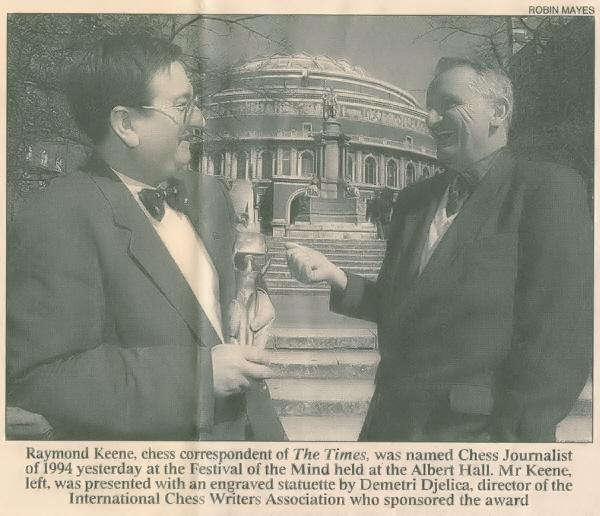
Outside The Times’ pages, the Director is better known as Dimitrije Bjelica, whose exploits include a two-volume work on Fischer: Robert Fišer – Genije koji se ne vraća (Belgrade, 1984). On pages 8-9 of its 5/1986 issue, New in Chess published a letter from Christiaan Bijl, the compiler of Die gesammelten Partien von Robert J. Fischer (first published in 1976, with a revised edition in 1986). Extracts from the letter are reproduced here with the kind permission of New in Chess:
‘... When he [Bjelica] started volume two it seems that he suddenly got very tired after having written page 49. From page 51 onwards to page 241(!) he tries to give Fischer’s games, introduced by the misleading heading ‘Sve Fišerove partije’ – the complete games of Fischer – but in fact he gives only a poor sixty per cent of them. To my surprise Bjelica has boldly used exact replicas of the copyrighted lay-out of my work ... Puzzled and dazed the reader discovers that games are completely cut to pieces, or rather spoiled in cuttings. Names of players are corrupted (...), authorised annotations are copied or badly cut off. Bjelica collected diagrams from my original edition, several of which he inserted in wrong places and he even used diagrams without the game scores! ... From some games he omitted moves or names of players, added the names of annotators between the moves of an unannotated game, or replaced the actual game moves by a variation. He created even a seven move miniature of Fischer versus Petrosian, and he outrageously omitted in many cases the sites of play and the game-numbers in matches ... The book oozes contempt for its buyers and is an insult to Fischer, who broke off all connections with Bjelica in 1971 after he had been cheated by this “friend”.
It is known in the chess-world that Bjelica’s reputation is a dubious one. With [this] publication he added another outrage of the worst sort to his long list of non-fulfillments, gross falsehoods and impostures.’
Mr Keene will surely triumph again if another such award is offered. Who else would even consider accepting it?
(Kingpin, 1995)
Our above-mentioned article Chess Awards also related the only subsequent news of the ‘Association’: in 2000 Mr Bjelica handed out a further award, and it was naturally to Mr Keene again.
The dates of Emanuel Lasker’s world championship reign, 1894-1921, are well known, but even an elementary matter like that can unhorse someone like Dimitrije Bjelica. Page 126 of his book Šahovska Čitanka (undated, but circa 1966) had the following:
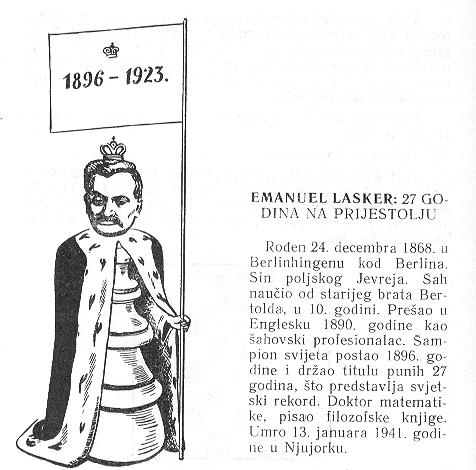
(3936)
Although Ajedrez La lucha por la iniciativa by Orestes Aldama Zambrano (Barcelona, 2000) refers to Fisher and Meking on the first page of text, it is a monograph on Capablanca. His opponents include Atkeens, Berstein, Bofoljubov, Corso, Kreymbour, Kupnich, Kvitz, Rogoljubow, Rubistein, Spielman and Tartakowwer, and all this may be termed ‘doing a Bjelica’.
(4458)
Numerous photographs of Capablanca from our 1989 monograph were misappropriated by Dimitrije Bjelica in his volume José Raúl Capablanca (Madrid, 1993).
Mr Bjelica’s book Kasparov protiv Karpova (Sarajevo, 1984) has only just come to our attention.
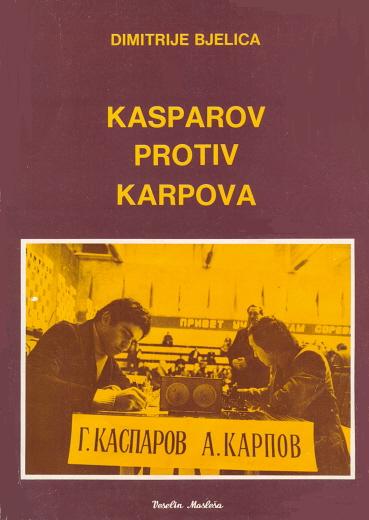
The multiplicity of formats, styles and typefaces pervading the book has an obvious explanation: Mr Bjelica’s clippers and glue-pot have been in action yet again. For example, pages 235-236 have a table of Karpov’s tournament results which is reproduced (without permission or acknowledgement, naturally) from a book edited by us, World Chess Champions (Oxford, 1981). Similarly, on pages 230-234 Mr Bjelica lifts (i.e. steals) from our book the entire list of 28 world championship matches held from 1886 to 1978. By the time Kasparov protiv Karpova was published, of course, Karpov and Korchnoi had played a further match, in Merano, and one can only marvel at the conscientious artistry with which Mr Bjelica updated our work:
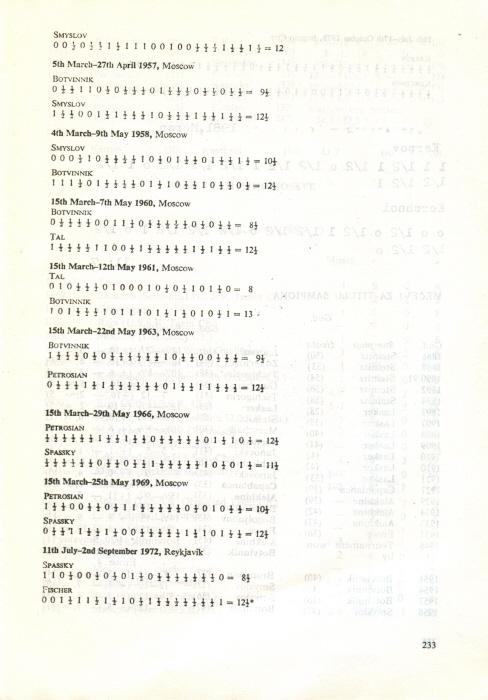
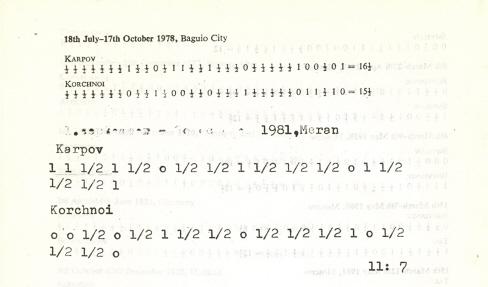
(6616)
Sandwiched between material plagiarized from World Chess Champions there appears on page 234 of Mr D. Bjelica’s Kasparov protiv Karpova a chart which, gratifyingly, does not come from our book:
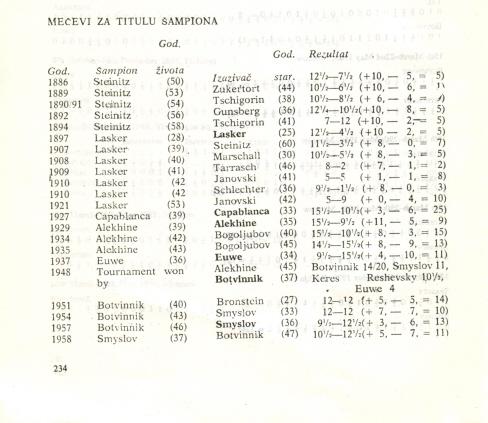
(6617)
Alan O’Brien (Mitcham, England) points out that the chart of world title match results shown in C.N. 6617 was lifted by Dimitrije Bjelica from a book by C.H.O’D. Alexander:
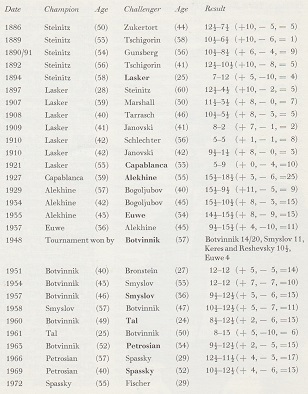
Fischer v. Spassky Reykjavik 1972 by C.H.O’D. Alexander (Harmondsworth, 1972), page 21
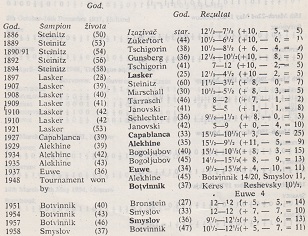

Kasparov protiv Karpova by D. Bjelica (Sarajevo, 1984), pages 234-235
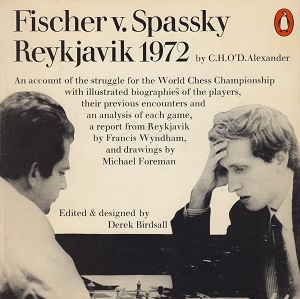
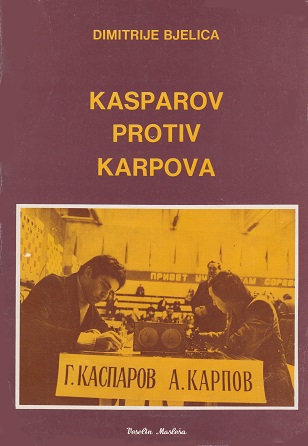
C.N. 9452 mentioned that copying usually goes hand-in-hand with incompetence, and it will be noted that misalignment on page 234 of Bjelica’s book resulted in a shambles:
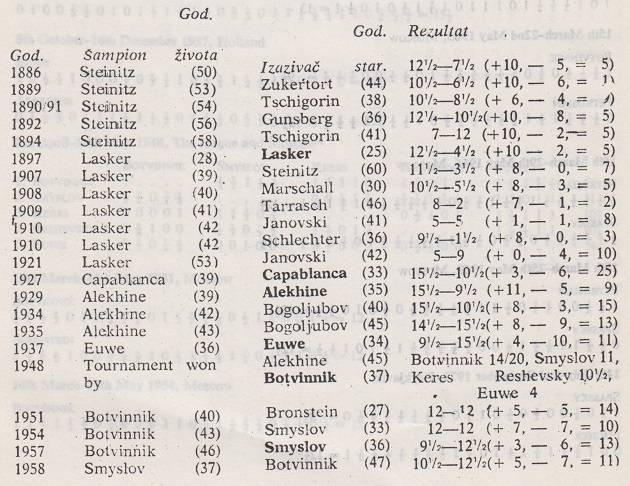
On page 20 of The Times, 22 April 1995 Bjelica was referred to as the Director of the International Chess Writers Association.
(10946)
Bjelica may truly be considered the quadrupled pawn of chess writers.
Further to the reference in C.N. 7466 to the ‘board problem’, a far rarer occurrence is an inverted diagram in a book. An example comes from page 174 of Il mio amico Karpov by D. Bjelica (Abano Terme, 1981):
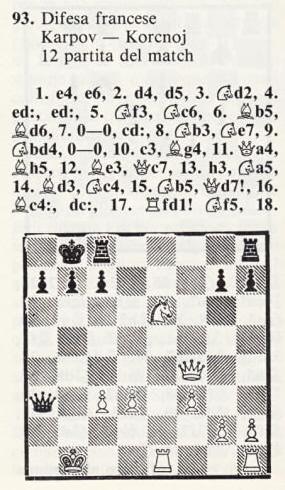
The position (after 21 Nxd6) was correct in the original edition; see page 252 of Rekao mi je Anatolij Karpov (Belgrade, 1981).
(7474)
From our feature article Searching for Bobby Fischer (Josh Waitzkin):
As the chess skill of Josh, a delightful child, develops, he is taken to the Soviet Union by his father and Pandolfini during the first Karpov-Kasparov match. The account is forceful and chilling (‘The all-night bars at the Cosmos are captained by heavy-lidded men who speak liquor and money in a dozen languages’ – page 69). Josh made a considerable impression on Soviet television viewers, and ‘during one interview he demonstrated a winning line for Kasparov with bubble gum all over his chin’ (page 76). Nor do the vagaries of chess journalists escape Fred Waitzkin:
‘Dimitrije Bjelica was a dynamo, turning out articles in different languages for various papers. Like a track star he raced from phone to phone, belting out stories. “I never write a thing; there’s no time”, he said. One afternoon while he took a frantic break, I mentioned some piece of gossip about Bobby Fischer. The following morning the story was printed in two different newspapers.’ (page 78)
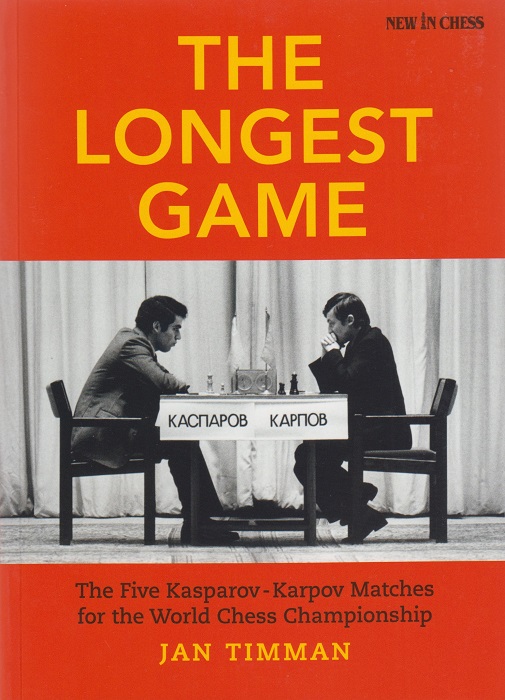
In the context of the 1986 world title match, on page 144 of The Longest Game by Jan Timman (Alkmaar, 2019) there is no mincing of words about Bjelica:
‘Karpov did not have a clear delegation leader, but he did have a press attaché: the Yugoslav Dmitri Bjelica. That was a strange choice, as Bjelica was known as a gutter journalist who wrote books that were full of printing errors and plagiarisms.’
(11226)
From page 129 of The Chess Scene by David Levy and Stewart Reuben (London, 1974):

The unspecified source proves a disappointment: the alleged Tal remark is on page 44 of the End-October 1965 issue of CHESS, in an article by Dimitrije Bjelica. It follows a brief reference to Tal’s win against Héctor Rossetto at the 1958 Interzonal tournament in Portorož and begins, ‘“You play like Lasker”, we said to Tal ...’
There was a different wording on page 237 of Bjelica’s Grandmasters in Profile (Sarajevo, 1973): ‘They say that Lasker is going to lose in every other game, about me they say that I am going to lose in every one.’
(11485)
Following the reference to D. Bjelica in C.N. 11585, a look at his current Wikipedia entry seems timely:
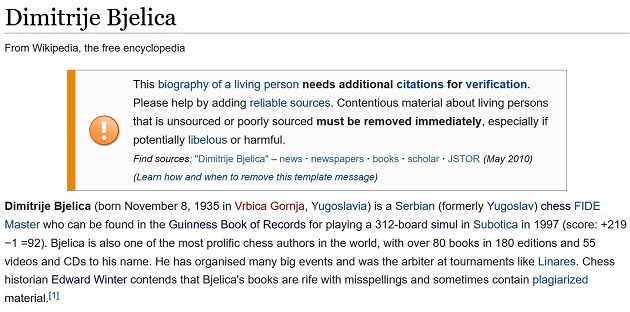
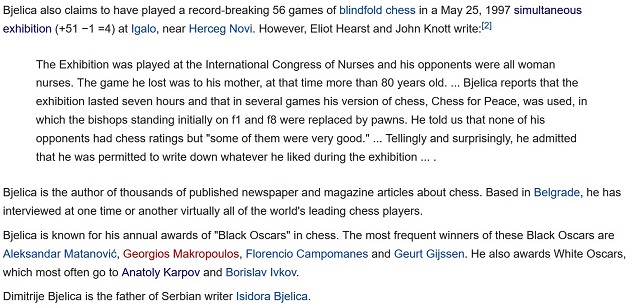
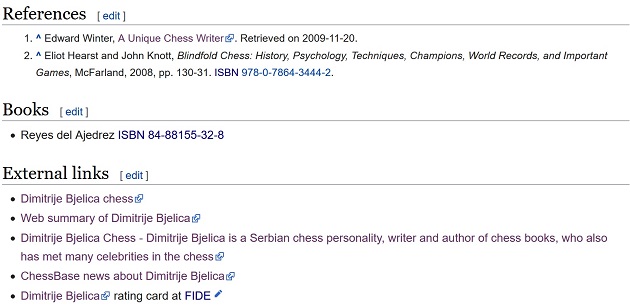
Given the alleged existence of ‘over 80 books in 180 editions’, it is an act of mercy that (contrary to the Wikipedia articles on, for instance, Bruce Pandolfini and Eric Schiller) the entry eschews a list and mentions only one alleged volume. However, that solitary reference, ‘Reyes del Ajedrez ISBN 84-88155-32-8’, is worthless because Bjelica had a series of books published under the generic title ‘Reyes del ajedrez’; the ISBN number given – randomly, it seems – is for the volume on Botvinnik (Madrid, 1994).
The first paragraph also affirms that Bjelica was ‘the arbiter at tournaments like Linares’. Which tournaments are ‘like Linares’ is an open question, and, in any case, no substantiation for the alleged role is provided. There is, at least, a little something on page 177 of the May 1988 BCM, in a report on the sixth ‘Ciudad de Linares’ tournament: ‘the chief arbiter was Viktor Baturinsky, helped by Dimitrije Bjelica and Diego Martinez Linares.’
Still in the first paragraph of the Wikipedia entry, we contend that ‘contends’ is far too weak a word in connection with the rifeness of misspellings and plagiarism in Bjelica’s books. It is not a contention, but the expression of an incontrovertible fact. The first of the two ‘References’ on the Wikipedia page will take the reader to Jan Timman’s description of Bjelica: ‘a gutter journalist who wrote books that were full of printing errors and plagiarisms.’
The references to ‘Black Oscars’ (with and without quotation marks) and ‘White Oscars’ (without quotation marks) appear outmoded, incomplete, unsubstantiated and irrelevant. Awards involving Bjelica need to be treated with the utmost caution. None of the ‘External links’ leads anywhere of value. The ChessBase one relates to a 2004 article with much dubious wording identical to what is still in the Wikipedia entry for Bjelica even today.
According to the first paragraph of the entry, Bjelica (a ‘FIDE Master’ with very few published games) ‘can be found in the Guinness Book of Records for playing a 312-board simul in Subotica in 1997 (score: +219 −1 =92)’, with the implication that the alleged record is still valid today. In which edition or editions of that book can such a display be found, and on whose authority was it included? We lack almost all pre-2005 editions of the Guinness work, but can confirm that Bjelica is not mentioned in any edition from 2005 to 2020.
On that unspecified day in 1997 did the ‘FIDE Master’ really dethrone Ulf Andersson, who had (although his own Wikipedia entry does not mention it) played the previous year against 310 opponents simultaneously in Älvsjö, Sweden? On that performance an illustrated, documented report was published on pages 32-33 of the January 1996 issue of Tidskrift för Schack.
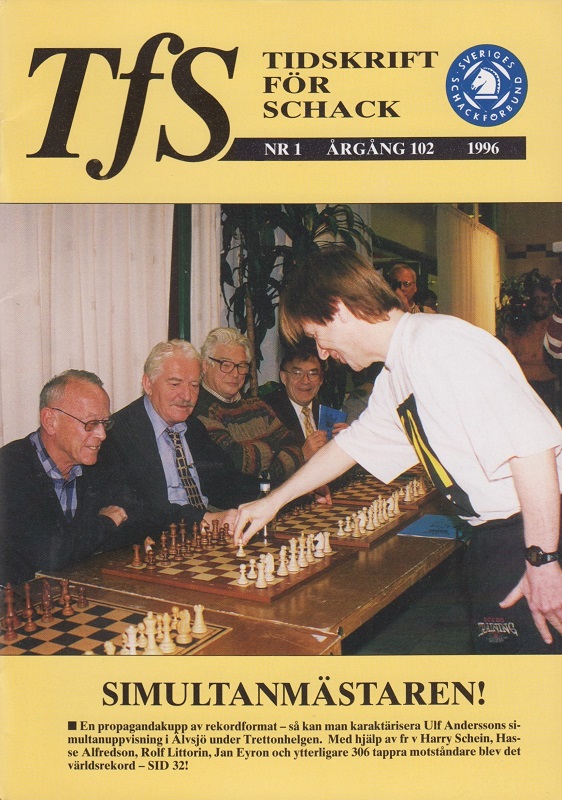
A basic search in Google Books shows that Bjelica was listed by Guinness in a number of editions in the 1980s, for an earlier alleged display:
‘Dimitrije Bjelica (Yugoslavia) played 301 opponents simultaneously (258 wins, 36 draws, 7 losses) in 9 hours on Sept. 18, 1982, at Sarajevo, Yugoslavia. Bjelica’s weight dropped by 4˝ lb as he walked a total of 12.4 miles.’
Without demurral, that claim was presented as still being a record on page 132 of The Even More Complete Chess Addict by M. Fox and R. James (London, 1993), but on what grounds? Video coverage of record attempts today often shows a Guinness adjudicator, ascetically dressed, with a pair of severe glasses, an unforgiving stopwatch, and pen menacingly poised over clip-board, but was any such invigilator present in Sarajevo during Bjelica’s alleged display? And what proof or corroboration was published in reliable Yugoslav sources of the time?
Concerning any alleged exploit by Dimitrije Bjelica there is, at the very least, fog. Nowadays, Wikipedia has some excellent chess entries, but Bjelica’s is currently one of the worst.
(11591)
The Bjelica article has been cut down and improved out of all recognition:
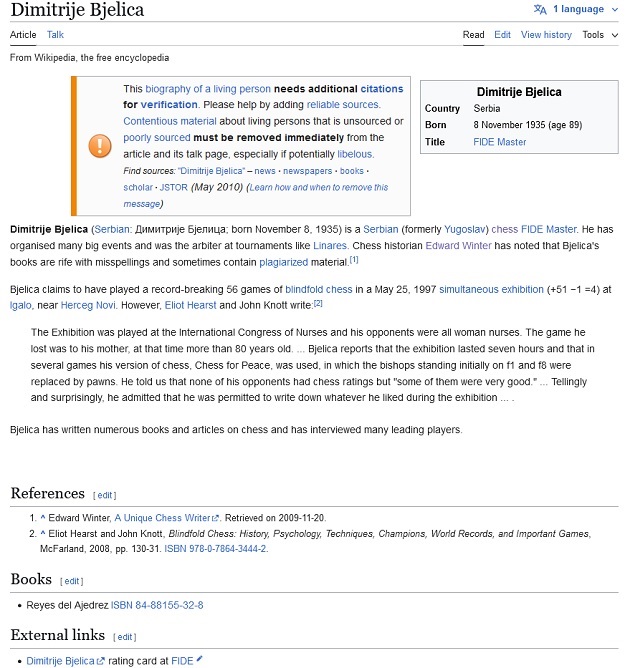
See also Wikipedia and Chess.
From our feature article which discussed Blindfold Chess by Eliot Hearst and John Knott (Jefferson, 2009):
There is also investigation of such curious episodes as the claim, from the early 1920s, that in Spain José Juncosa played 32 blindfold games simultaneously (pages 66-67). The co-authors grapple with the perennial problem of matching George Koltanowski’s statements with the public record, although they take quite an indulgent view of his ‘many inconsistencies, unfounded remarks, and errors in his writings’ (page 83). Particular difficulties arise with an important matter: the claims of János Flesch that he gained the world record by playing 52 games simultaneously in Budapest in 1960. Those claims are considered untenable, but the detailed examination (pages 99-110) states that ‘the two authors of this book disagree on how to view Flesch’s overall status as a blindfold champion and how to treat opinions of others about him’. The claims of Dimitrije Bjelica to have played 56 blindfold games in Igalo, near Herceg Novi, in 1997 are, of course, easier to dismiss (pages 130-131).
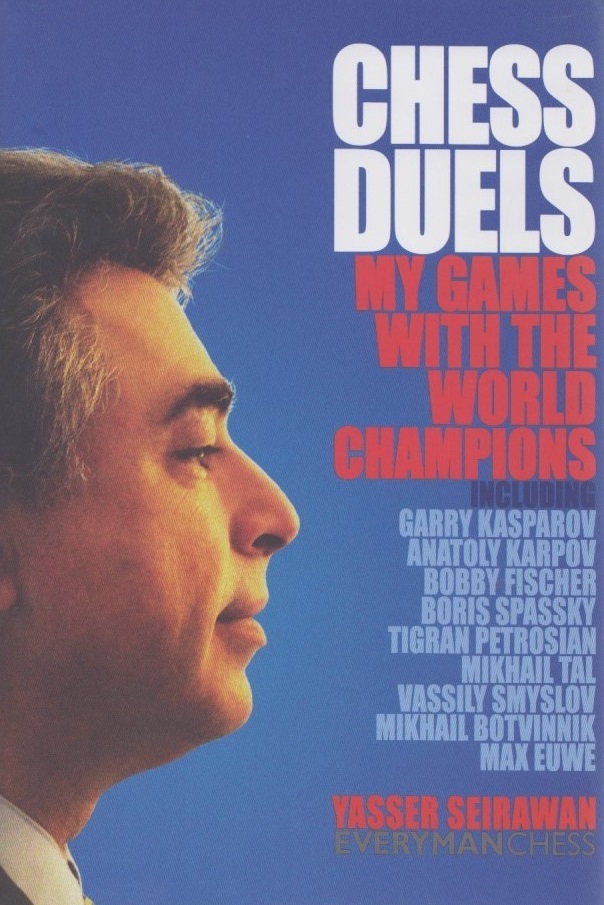
A paragraph on page 241 of Chess Duels by Yasser Seirawan (London, 2010):
‘We [Kasparov and Seirawan] next met in Bugojno in 1982, the site of one of his most celebrated breakthrough victories. I had accepted an invitation to play. I arrived in Bugojno to find out that I had been “uninvited” and that Miguel Najdorf would take my place. No one bothered to inform me. Ahem. The organizer of the Bugojno tournament, Dimitrije Bjelica, positively put the Linares organizer Luis Rentero on a pedestal of truth, virtue and honesty. It is a travesty that Mr Bjelica is allowed in the chess world at all. For me, he is simply not to be trusted. Let us say I tried as best I could to recover some travel expense money and never returned to the event again.’
On 18 June 2025 Wikipedia’s pages on Bjelica (in English and Serbian) recorded his death, at the age of 89.
Our article on Dimitrije Bjelica currently has little on his relations with Bobby Fischer.
John Donaldson (Berkeley, CA, USA) has provided the following from pages 104 and 128 of CHESS, November 1970 (extracts from an article by Bjelica):
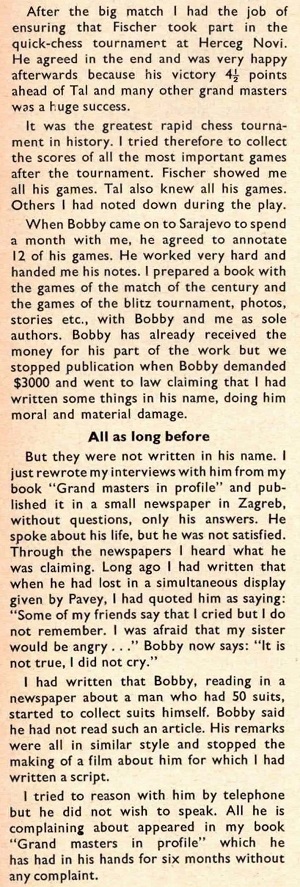
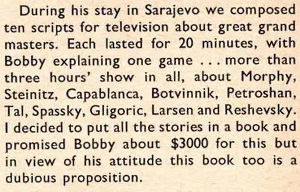
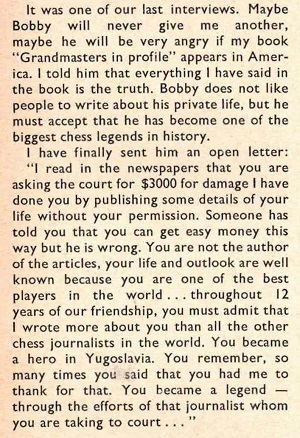
From page 31 of the New York Times, 28 August 1973:
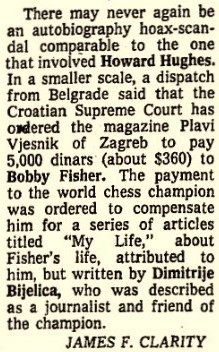
Can more information be found from, in particular, sources in Zagreb and Belgrade?
(12178)
To the Chess Notes main page.
To the Archives for other feature articles.
Copyright: Edward Winter. All rights reserved.